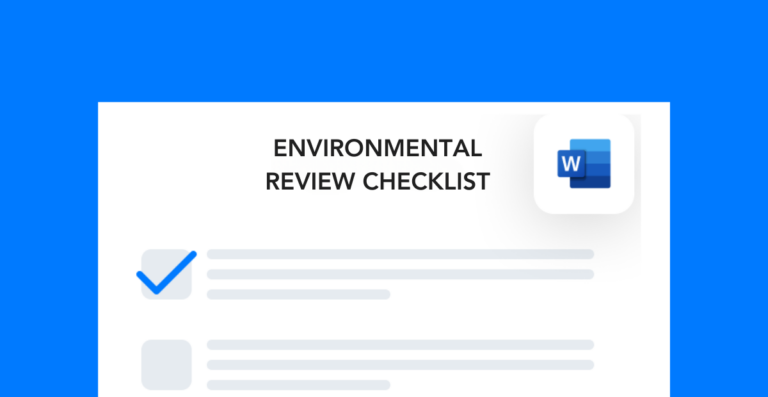The term “environmental safety” can refer to either the planet or the workplace, depending on the context. Exploring any environmental safety topic can help you ensure that stakeholders at both ends of your processes are safe from harmful toxins, pathogens, chemicals, and more.
Nowadays, businesses are under more pressure than ever to be transparent about their environmental practices. But the majority of companies still aren’t ready to publicly disclose this information. Whether you consistently pursue sustainable practices or want to completely overhaul your approach, here are some environmental safety topics to revisit at your next team meeting.
Free checklist!
This template covers some of the basic issues that an environmental safety topic might address around your worksite.
In general, the term “environmental safety” can refer to either the natural environment or the work environment. These areas of EHS protect the planet and workers, respectively. But when you target one, you’ll most likely be able to positively impact the other as well.
The following are organized into general environmental safety topic categories. Depending on the industry you’re in, some or all these topics may apply to your operation. Stick to the list or expand on each topic to create a site-specific bank of ideas for your next team meeting or toolbox talk.
Gas
- Cylinder safety training
- Compressed gas storage procedures
- Safe disposal of leaking cylinders and other compressed gas containers
- How often to buy gases and avoid large stockpiles
- Scheduling regular inspections of stored gases
Chemical
- Storing chemicals inside the facility
- Storing chemicals in outdoor structures (corrals, garage, shed, etc.)
- Emergency spill response procedures
- Safe handling protocols and how they fit into the process
- Ways to improve chemical safety training
- Pesticide PPE
- Proper dilution and use of pesticides
Air quality
- Air quality monitors and alarm systems
- Maintenance of ventilation system
- Training workers to notice signs of dangerous air quality, an essential environmental safety topic.
- Lockout tagout procedures for hazardous gas detection equipment
Trash and recycling
- Corrugate recycling procedures that avoid fire hazards
- In-house waste processing vs. third-party waste processing
- Setting up a procedure for repairing damaged equipment
- Establishing a recycling program in worker breakrooms
- Training employees on the types of waste that can and can’t be recycled
- 5S reorganization to encourage increased recycling
Natural disaster preparedness
- Site gutter system maintenance for preventing flooding
- Implementing a fire watch program
- Labeling of emergency shelter and safe zones
- Ensuring that the site has emergency safety gear outside for cold weather evacuations
- Updating or refreshing evacuation procedures
Biological waste
- Clear identification of biological waste containers
- Safe disposal of hazardous biowaste
- Using certain types of biowaste for property management (composting, landscaping, etc.)
- Creating a designated area for the handling of all biowaste
- Improving signage for biological waste disposal
Wastewater
- Septic system preparedness for natural disasters (hurricanes, floods, wildfires, etc.)
- Routine septic system inspections
- Preventative maintenance for septic systems
- Detecting groundwater contamination onsite
- Testing surface waters for both nutrients and pathogens, which is another key environmental safety matter.
There are endless ways that your site can improve its impact on public health and the surrounding ecosystem. This list of environmental safety topics isn’t meant to be exhaustive. You can break down each topic into smaller concerns, jotting down ideas as they come to you.
As you dive into each category, build a longer list of readily available topics to bring up during safety team meetings, GEMBA walks, and all-hands gatherings as well. An environmental safety topic ensures that your discussions maintain this focus.




